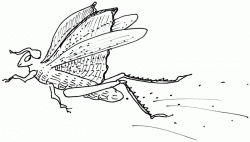Flying frass: Grasshopper poop travels far
Q. Did you catch the entomological journal study titled, "Flying distance of frass kicked by the grasshopper Atractomorpha lata and factors affecting the flying distance"? What was the point? –J. Cricket
A. "Frass," for anyone unfamiliar with the niceties of grasshopper life, is the powdery waste material passed by plant-eating insects, says New Scientist magazine. Adult grasshoppers use a hind leg kick to project their frass a considerable distance, averaging 252 and 487 millimeters for males and females respectively, or more than 10 times their body length and 100 times the length of the frass pellet. Unfortunately, added the journal, "Now that this aspect of the grasshopper lifestyle has been so thoroughly investigated, putative authors searching for an original topic will just have to find something else."
Q. We'd all like to believe that The Good is stronger than The Bad, but is it? What do psychologists say? –C. Eastwood
A. In everyday life, bad events have stronger and more lasting consequences than comparable good events, says David G. Myers in Social Psychology. Consider:
* Destructive acts harm close relationships more than constructive acts build them. (Cruel words linger after kind ones have been forgotten.)
* Despite our natural optimism, it's easier to recall past bad emotional events than good ones.
* Losing money upsets people more than gaining the same amount makes them happy.
* A bad reputation is easier to acquire and harder to shed than a good one. (A single act of lying can destroy one's reputation for integrity.)
* We are sensitive to the slightest hint of criticism: Said writer Larry L. King, "I have discovered over the years that good reviews strangely fail to make the author feel as good as bad reviews make him feel bad."
* A survey of the PsycINFO database found nearly a quarter million mentions of anger, anxiety, or depression compared to barely 15,000 for life satisfaction, joy, or happiness.
* It's a general rule of life, notes psychologist Roy Baumeister, that "Bad is Stronger than Good," which is perhaps the best reason for a positive psychology movement. To overcome the strength of individual bad events, "human life needs far more good than bad."
Q. When people die, what's one of the most unusual things that can die out with them? –J. Teague
A. The language they speak, answers ScienceIllustrated.Com magazine. Of the approximately 7,000 languages in the world today, English and Mandarin Chinese top the list with 1.5 billion and 1.3 billion, respectively. The 3,500 least common languages are spoken by just two-tenths of one percent of the world's population, with roughly 500 of them– mainly tribal tongues– in immediate danger of dying out. About 20 languages are currently spoken by just one person. The "Bo" language died in 2010 with Boa Sr., the last remaining speaker.
Q. A woodpecker has no knowledge of bioinspiration or biomimetics, but some experts in these fields know the bird quite well. What do they know? –A. Hale
A. Woodpecker anatomy has inspired a new shock absorber for delicate electronics in plane crashes and bombings, say S. H. Yoon and S. Park in American Scientist magazine. Since the birds repeatedly drum their heads against hard surfaces without brain damage, engineers used x-ray scans of a golden-fronted woodpecker to model its shock-absorbing structures, including elastic beak and spongy skull. Then the researchers mimicked key parts of the bird's head with a cylinder made of metal, rubber, and porous glass. Diodes and other delicate devices inside the cylinder survived more than 99 percent of test hits into a wall at a deceleration 60,000 times that of gravity. "Survival was only 74 percent in conventional shock absorbers."
~
Send Strange questions to brothers Bill and Rich at [email protected]
